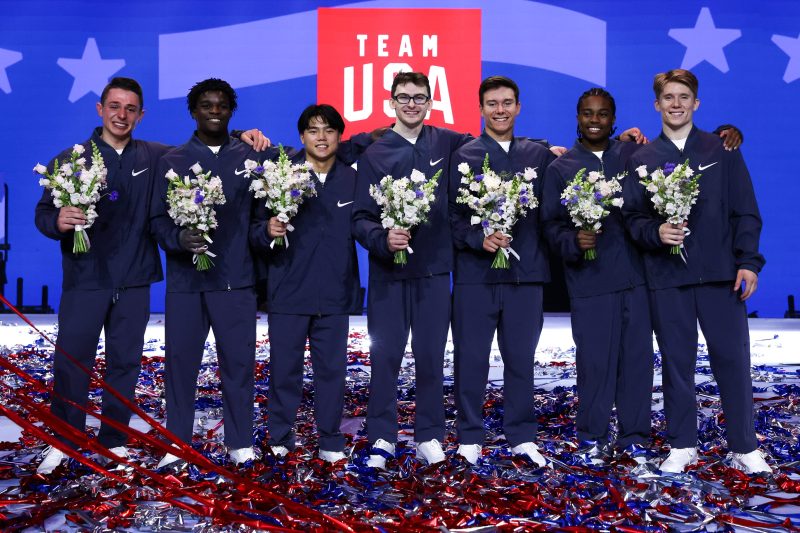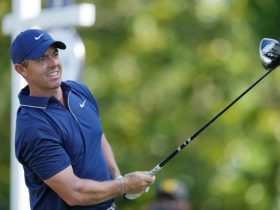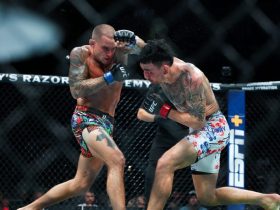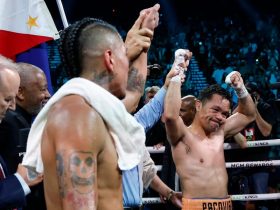PARIS — Winning an Olympic team medal is difficult.
Difficulty doesn’t have to be what keeps the U.S. men’s gymnastics team from winning one, however.
Since the Tokyo Olympics, where they finished fifth for a third straight Games, the Americans have prioritized making their routines harder in hopes of breaking what is now a 16-year medal drought. You can do the most beautiful gymnastics in the world and it won’t matter if your skills aren’t as difficult as what the top teams are doing.
“I hate to say that about Tokyo but yeah, that was kind of what that was,” said Brody Malone, referring to the 7-point gap between the U.S. men and China, the bronze medalists.
Get Olympics updates in your texts! Join USA TODAY Sports’ WhatsApp Channel
In the gymnastics scoring system, there is one score for the difficulty value of a routine and another for how well it’s executed. The Americans still lag well behind Japan and China, perennial favorites in men’s gymnastics. But with no Russia, which won the team title both in Tokyo and at the world championships before it, the bronze medal is there for the taking.
According to neutraldeductions.com, a website devoted to men’s gymnastics, the U.S. men have a potential difficulty score of 105.60 in the team final, where three gymnasts compete on each event and all three scores. That’s exactly one point less than Ukraine and 0.60 points ahead of Britain.
“It’s just scoring,” Frederick Richard said. “You can see our scores are much higher as a team scenario than they ever have been in the past.”
The fifth-place finishes in London and Rio were disappointing because the U.S. men had finished first and second, respectively, in qualifying. By Tokyo, however, it was clear they were no longer in the same class as China, Japan and Russia.
The difficulty disadvantage was so great, in fact, the U.S. men were already 6.5 points behind before a single routine was done.
“Walking in, it was like, they’re going to have to fall six times AND we’re going to have to have the meet of our life if we’re going to get on the podium,” said Thom Glielmi, who coaches Olympian Asher Hong at Stanford.
It wasn’t as if this was a big secret. The men’s team had been talking for several years about needing more difficulty to keep pace with the powerhouses. But it wasn’t so easy to do. It takes time to upgrade routines and the results in the interim aren’t always pretty. That’s problematic for both the gymnasts still competing in college, where all scores are counted, as well as those who are done and rely on national team funding to pay their bills.
So post-Tokyo, the men’s team instituted a bonus program that gave more credit for more difficult skills. Or, rather, didn’t punish gymnasts for attempting more difficult skills.
“This bonus system would basically eliminate a fall, for example. If you fell attempting a certain whatever, it would still be OK and you could maintain your national team spot,” said Brett McClure, a silver medalist with the U.S. men in 2004 and now the team’s high-performance director.
“It was a tool that kind of helped coaches buy into it a little bit more and say it is beneficial for us to continue to push this.”
It led to some skewed results — why is this gymnast who won this event at the national championships finishing eighth at worlds? — but it had the desired effect.
At last year’s world championships, the U.S. men won their first team medal since 2014, a bronze. Additionally, Richard was the bronze medalist in the all-around and Khoi Young, an alternate on the Paris squad, was the silver medalist on both pommel horse and vault.
“If you look at the past two world championships, we were in the mix to medal. And it was because we had pushed the difficulty,” said Glielmi, who also coaches Young at Stanford. “The difficulty bonus that was incorporated into the scoring system, those athletes got onto world teams.”
Of course it helps that Russia hasn’t been at a major international meet since Tokyo. But there’s no denying the mindset of the men’s team has changed. No elite athlete wants to go to an event knowing they have no shot at a medal, and the U.S. men have seen firsthand the difference in their results with the big skills and without.
There’s still work to do to catch up to Japan and China. But the climb isn’t nearly as steep as it was three years ago.
Now the goal is for it to be completely gone by Los Angeles in 2028.
“Give everything this Olympics and show that we have the potential to bring home medals. Then it’s go everything to the wall to make sure it’s not about medals anymore, it’s about gold medals for 2028,” Richard said.
That doesn’t sound so difficult.
Tom Schad contributed.
Follow USA TODAY Sports columnist Nancy Armour on social media @nrarmour.






